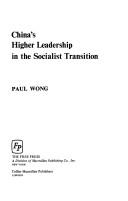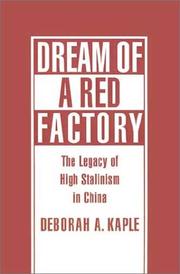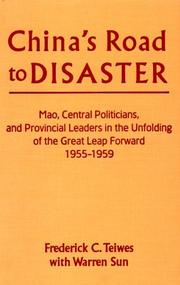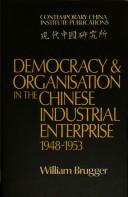| Listing 1 - 10 of 24 | << page >> |
Sort by
|
Book
ISBN: 023103900X Year: 1975 Publisher: New York (N.Y.): Columbia university press
Abstract | Keywords | Export | Availability | Bookmark
 Loading...
Loading...Choose an application
- Reference Manager
- EndNote
- RefWorks (Direct export to RefWorks)
China --- Chine --- Politics and government --- Politique et gouvernement --- S06/0421 --- S06/1040 --- #SML: Joseph Spae --- China: Politics and government--CCP: 1949 - 1966 --- China: Politics and government--Socialist Education Movement (1962-65) --- -China --- -S06/0421

ISBN: 0029356008 Year: 1976 Publisher: New York (N.Y.): Free Press
Abstract | Keywords | Export | Availability | Bookmark
 Loading...
Loading...Choose an application
- Reference Manager
- EndNote
- RefWorks (Direct export to RefWorks)
Elite (Social sciences) --- Elite (Sciences sociales) --- China --- Chine --- Politics and government --- Politique et gouvernement --- S06/0421 --- S11/0708 --- -#SML: Joseph Spae --- China: Politics and government--CCP: 1949 - 1966 --- China: Social sciences--Elite --- -Elite (Social sciences) --- Elite (Social sciences). --- -S06/0421 --- -Elite (Social sciences). --- #SML: Joseph Spae

ISBN: 0195083156 0195359453 1280526874 1429405651 9780195359459 9780195083156 0197712665 Year: 1994 Publisher: New York Oxford University Press
Abstract | Keywords | Export | Availability | Bookmark
 Loading...
Loading...Choose an application
- Reference Manager
- EndNote
- RefWorks (Direct export to RefWorks)
Drawing on previously unknown primary sources in both Chinese and Russian, Deborah A. Kaple has written a powerful and absorbing account of the model of factory management and organization that the Chinese communists formulated in the 1949-1953 period. She reveals that their "new" management techniques were adapted from Soviet propaganda during the harsh period of Stalin's post-war reconstruction. The idealized Stalinist management system consisted mainly of strict Communist Party control of all aspects of workers' lives, which is the root of such strong Party control over Chinese society today. Dream of a Red Factory is a rare and revealing look at the consolidation rule in China; told through the prism of the development of new "socialist" factories and enterprises. Kaple completely counters the old myth of the "Soviet monolith" in China, and carefully reconstructs how the Chinese communists came to rely on an idealized, propagandistic version of the Soviet model instead.
Industrial organization --- Industrial management --- Socialism --- Industries --- Management --- China --- E-books --- Soviet Union --- Industrial organization - China. --- Industrial organization - Soviet Union. --- S06/0421 --- S10/0580 --- China: Politics and government--CCP: 1949 - 1966 --- China: Economics, industry and commerce--Management of enterprises (general, theories)
Book
ISBN: 0710034636 Year: 1979 Publisher: London Routledge and Kegan Paul
Abstract | Keywords | Export | Availability | Bookmark
 Loading...
Loading...Choose an application
- Reference Manager
- EndNote
- RefWorks (Direct export to RefWorks)
S06/0421 --- S06/1000 --- S11/0535 --- S20/0720 --- #SML: Joseph Spae --- China: Politics and government--CCP: 1949 - 1966 --- China: Politics and government--Political campaigns --- China: Social sciences--People's Communes --- China: Agriculture forestry, fishery, natural disasters--Communes (agrarian aspects)

Abstract | Keywords | Export | Availability | Bookmark
 Loading...
Loading...Choose an application
- Reference Manager
- EndNote
- RefWorks (Direct export to RefWorks)

ISBN: 0521207908 Year: 1976 Publisher: Cambridge Cambridge University press
Abstract | Keywords | Export | Availability | Bookmark
 Loading...
Loading...Choose an application
- Reference Manager
- EndNote
- RefWorks (Direct export to RefWorks)
Business management --- Personnel management --- China --- S06/0421 --- S10/0241 --- S10/0580 --- Industries --- -#SML: Joseph Spae --- Industrial production --- Industry --- Economics --- China: Politics and government--CCP: 1949 - 1966 --- China: Economics, industry and commerce--General works and economic history: 1949 - 1966 --- China: Economics, industry and commerce--Management of enterprises (general, theories) --- #SML: Joseph Spae
Book
ISBN: 9780774817271 9780774817264 Year: 2010 Publisher: Vancouver University of British Columbia
Abstract | Keywords | Export | Availability | Bookmark
 Loading...
Loading...Choose an application
- Reference Manager
- EndNote
- RefWorks (Direct export to RefWorks)
S06/1030 --- S04/0920 --- S06/0421 --- S20/1040 --- China: Politics and government--Big Leap Forward (1958) --- China: History--PRC: 1958 - 1966 --- China: Politics and government--CCP: 1949 - 1966 --- China: Agriculture forestry, fishery, natural disasters--Famine and famine relief --- Famines --- Famine --- Food supply --- Starvation --- History --- China --- Economic conditions --- Economic policy --- Politics and government --- Social conditions
Book
ISBN: 9783110531046 Year: 2018 Publisher: Berlin Walter de Gruyter GmbH
Abstract | Keywords | Export | Availability | Bookmark
 Loading...
Loading...Choose an application
- Reference Manager
- EndNote
- RefWorks (Direct export to RefWorks)
The relationship between politics and law in the early People’s Republic of China was highly contentious. Periods of intentionally excessive campaign justice intersected with attempts to carve out professional standards of adjudication and to offer retroactive justice for those deemed to have been unjustly persecuted. How were victims and perpetrators defined and dealt with during different stages of the Maoist era and beyond ? How was law practiced, understood, and contested in local contexts ? This volume adopts a case study approach to shedlight on these complex questions. By way of a close reading of original case files from the grassroots level, the contributors detail procedures and question long-held assumptions, not least about the Cultural Revolution as a period of “lawlessness.”
Law --- History --- Cases. --- China --- Politics and government --- Acts, Legislative --- Enactments, Legislative --- Laws (Statutes) --- Legislative acts --- Legislative enactments --- Jurisprudence --- Legislation --- S06/0421 --- S06/0422 --- S08/0350 --- China: Politics and government--CCP: 1949 - 1966 --- China: Politics and government--CCP: 1966 - 1976 --- China: Law and legislation--General works and codices: since 1949
Book
ISBN: 1501716611 0801462231 9780801462238 0801449340 9780801449345 9780801449345 9781501713538 1501713531 9781501716614 Year: 2011 Publisher: Ithaca, N.Y. Cornell University Press
Abstract | Keywords | Export | Availability | Bookmark
 Loading...
Loading...Choose an application
- Reference Manager
- EndNote
- RefWorks (Direct export to RefWorks)
In this sweeping portrait of the political culture of the early People's Republic of China (PRC), Chang-tai Hung mines newly available sources to vividly reconstruct how the Chinese Communist Party (CCP) tightened its rule after taking power in 1949. With political-cultural projects such as reconstructing Tiananmen Square to celebrate the Communist Revolution; staging national parades; rewriting official histories; mounting a visual propaganda campaign, including oil paintings, cartoons, and New Year prints; and establishing a national cemetery for heroes of the Revolution, the CCP built up nationalistic fervor in the people and affirmed its legitimacy. These projects came under strong Soviet influence, but the nationalistic Chinese Communists sought an independent road of nation building; for example, they decided that the reconstructed Tiananmen Square should surpass Red Square in size and significance, against the advice of Soviet experts sent from Moscow.Combining historical, cultural, and anthropological inquiries, Mao's New World examines how Mao Zedong and senior Party leaders transformed the PRC into a propaganda state in the first decade of their rule (1949-1959). Using archival sources only recently made available, previously untapped government documents, visual materials, memoirs, and interviews with surviving participants in the Party's plans, Hung argues that the exploitation of new cultural forms for political ends was one of the most significant achievements of the Chinese Communist Revolution. The book features sixty-six images of architecture, monuments, and artwork to document how the CCP invented the heroic tales of the Communist Revolution.
Symbolism in politics --- Arts --- Communism and culture --- Political culture --- Symbolic politics --- Political science --- Arts, Fine --- Arts, Occidental --- Arts, Western --- Fine arts --- Humanities --- Culture and communism --- Culture --- History --- Political aspects --- China --- Cultural policy. --- Politics and government --- S02/0200 --- S06/0421 --- S06/0900 --- China: General works--Civilization and culture, nation, nationalism --- China: Politics and government--CCP: 1949 - 1966 --- China: Politics and government--Political propaganda --- Arts, Primitive
Book
ISBN: 9780824886905 0824886909 9780824884574 9780824892609 9780824886912 Year: 2021 Publisher: Honolulu
Abstract | Keywords | Export | Availability | Bookmark
 Loading...
Loading...Choose an application
- Reference Manager
- EndNote
- RefWorks (Direct export to RefWorks)
Using a unique interdisciplinary, cultural-institutional analysis, Politics of Control is the first comprehensive study of how, in the early decades of the People's Republic of China, the Chinese Communist Party reshaped people's minds using multiple methods of control. With newly available archival material, internal circulars, memoirs, interviews, and site visits, the book explores the fascinating world of mass media, book publishing, education, religion, parks, museums, and architecture during the formative years of the republic. When the Communists assumed power in 1949, they projected themselves as not only military victors but also as peace restorers and cultural protectors. Believing that they needed to manage culture in every arena, they created an interlocking system of agencies and regulations that was supervised at the center. Documents show, however, that there was internal conflict. Censors, introduced early at the Beijing Daily, operated under the “twofold leadership” of municipal-level editors but with final authorization from the Communist Party Propaganda Department. Politics of Control looks behind the office doors, where the ideological split between Party chairman Mao Zedong and head of state Liu Shaoqi made pragmatic editors bite their pencil erasers and hope for the best. Book publishing followed a similar multi-tier system, preventing undesirable texts from getting into the hands of the public. In addition to designing a plan to nurture a new generation of Chinese revolutionaries, the party-state developed community centers that served as cultural propaganda stations. New urban parks were used to stage political rallies for major campaigns and public trials where threatening sects could be attacked. A fascinating part of the story is the way in which architecture and museums were used to promote ethnic unity under the Chinese party-state umbrella. Besides revealing how interlocking systems resulted in a pervasive method of control, Politics of Control also examines how this system was influenced by the Soviet Union and how, nevertheless, Chinese nationalism always took precedence. Chang-tai Hung convincingly argues that the PRC's formative period defined the nature of the Communist regime and its future development. The methods of cultural control have changed over time, but many continue to have relevance today.
S06/0421 --- S06/0422 --- S06/0436 --- S06/0900 --- China: Politics and government--CCP: 1949 - 1966 --- China: Politics and government--CCP: 1966 - 1976 --- China: Politics and government--Policy towards literature and art --- China: Politics and government--Political propaganda --- China --- Politics and government --- Cultural policy.
| Listing 1 - 10 of 24 | << page >> |
Sort by
|

 Search
Search Feedback
Feedback About
About Help
Help News
News